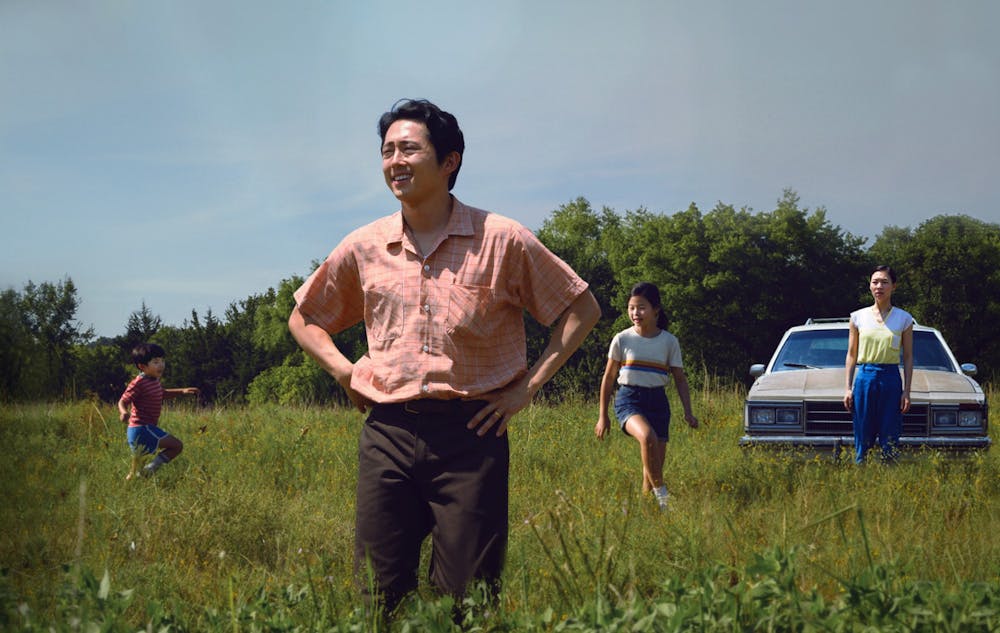The following contains spoilers for 'Minari.'
Based on director Lee Isaac Chung’s real upbringing, A24’s dramatic film Minari is a tender, character–driven study of a family that both loves each other and struggles to live together. It's aware of the significance of the mundane moments in life, and it forces viewers to pay attention.
Minari follows the Korean American Yi family, after they move from California to rural Arkansas in the 1980s. Parents Monica and Jacob struggle with their differing goals, their worry over the success of the farm, and their concern for their young son, David, who suffers from a heart murmur. When Monica’s mother moves from Korea to help babysit the Yi children, David struggles to accept her as a nurturing figure.

Steven Yeun, Alan S. Kim, Yuh-Jung Youn, Yeri Han, Noel Cho
Photo by Josh Ethan Johnson / A24
The understated performances by Steven Yeun and Yeri Han, who play Jacob and Monica Yi respectively, elevate the intimacy and deep emotionality of the film. The immensely talented cast of child actors, Alan Kim and Noel Kate Cho, who play David and Anne Yi, also steal all of their scenes.
So much of the film is colored by the Asian American immigrant experience in a way rarely tackled by media. It focuses on how children of immigrants straddle their dual identities and can end up alienated from their homelands. Through the relationship between David and his grandmother, Soonja, it explores the barrier that crops up between children of immigrants and their grandparents, who often live so far away.
David and Anne constantly say Soonja “isn’t a real grandma” because she can’t bake cookies or read, defying the image of grandmothers they have grown up with. However, Soonja calls David “strong” in her broken English, teaches him to play cards, dotes on him, and shows him where to grow the titular minari plant—revealing the immense love that exists between family despite great emotional and physical distance.
Minari never sacrifices its authenticity to cater to a primarily white audience. The majority of the film is in Korean, with English used mainly by the children or when talking to white characters. However, it doesn’t shy away from the fact that it is about a Korean American family moving to predominantly white Arkansas in the '80s, lightly referencing Reagan’s presidency and the Korean War. In a memorable scene where the Yi family attends church, another girl turns to Anne and imitates what she thinks Korean sounds like in a babble of racist sounds. It is a child’s ignorance, but reflects an experience many Asian American children face.
The heart of the film is rooted in the family’s connections to one another. It illuminates the friction that exists within relationships with raw authenticity. The major conflict of the film is between Monica and Jacob, who have vastly different desires for their family’s future. Monica wants to move back to the city, where they can make more money and live securely. Jacob, who despairs over spending his entire life working at a chicken hatchery, is determined to make the farm work, referring to it as his “Garden of Eden.” Both suffer from feelings of loneliness and inadequacy. Jacob’s dream is his last chance to show his children that he can succeed, and it combines an American agricultural sentiment with his pride in growing Korean vegetables.

Yeri Han, Steven Yeun
Photo by Josh Ethan Johnson / A24
There are times when the film lags with scenes that run a bit too long instead of focusing on strong central themes. However, it is most compelling when it leans into scenes of familial intimacy. Anne and David make paper airplanes with the words “stop arguing” and throw them at Monica and Jacob when they’re fighting. Monica and Anne sit together after Soonja has a stroke, and Monica thanks Anne for taking care of the family and staying strong. Monica washes Jacob’s hair after he hurts himself working on the farm. Soonja clings to David and soothes him to sleep when he tells her he’s afraid to die.
Soonja has her stroke right when she and David start warming up to each other. Near the end of the film, when Monica and Jacob are at a breaking point, she accidentally sets their barn filled with produce on fire in her confusion. There is brutality in the beauty of the film, in the toll of sacrifice—leaving behind the people and culture you love, the devastation of a beloved grandmother’s failing health, and dreams that burn to the ground.
Ultimately, Minari is a film about finding a place to belong and choosing to find that place with your family. It is about picking a good place to grow, whether it’s your children, your dream, or just some minari. It is only once Monica accepts Jacob’s dream and he accepts her religious faith that they can come together. There is no direct resolution at the end of the film, but the viewer has a sense that the Yi family is choosing to be on the same page. Monica and Jacob have saved each other, both from the difficulty of life as an immigrant and a burning building.
Near the end of the film, Soonja wanders away from the barn she has unwittingly burned down. David breaks into a sprint for the first time, unrestrained by his heart problems, in order to reach out to his grandmother—the surest sign of his physical and emotional progress.







